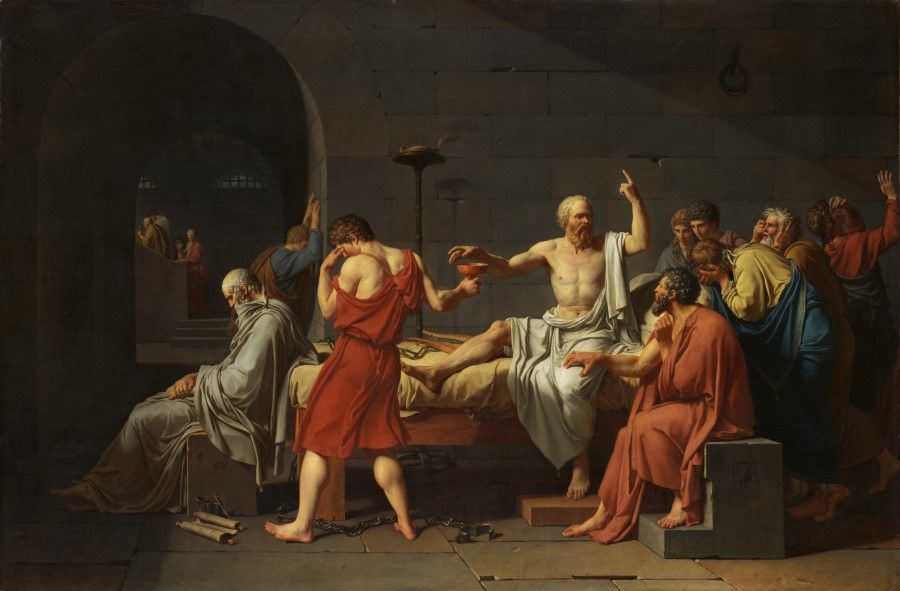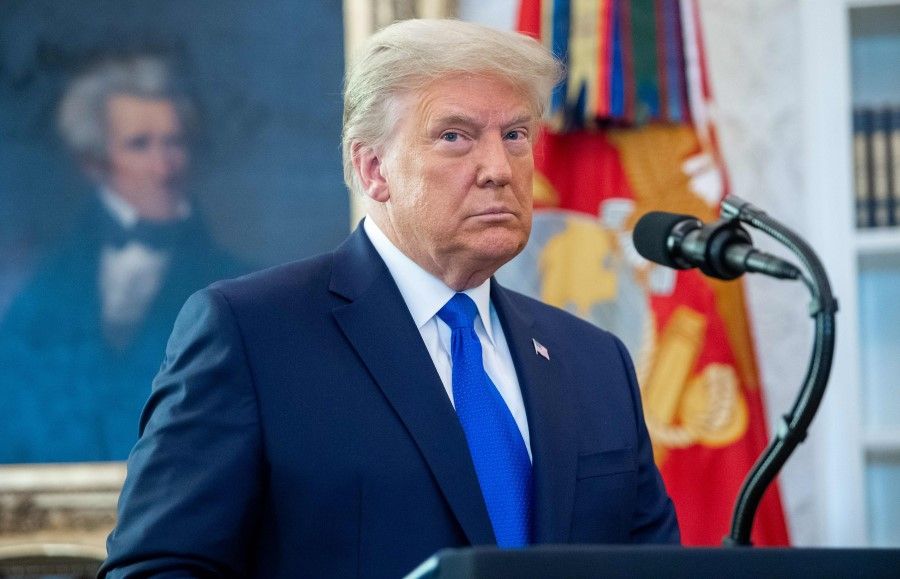America's flawed democracy: When power and cognitive abilities of the people fail to match

Academics have identified and named several "traps", including the Thucydides Trap, Tacitus Trap, and the Kindleberger Trap. But there is one other confounding trap: the "Socratic Trap". In democratic politics, this refers to the perpetual gap between the people's cognitive abilities and the power they hold, leading to problems in putting into practice the principles of democracy and good governance.
The trial of Socrates and the trap within
The chaotic 2020 US presidential election has cast doubt on the US as the world's beacon of democracy, and burst a bubble for many, which to me is not at all surprising. Such chaos is inevitable given the path of democratic progress. The theoretical basis for this can be kept for later discussion, but in history, the potential for chaos dates back to the trial of the Greek philosopher Socrates.
In 399 BC, the 70-year-old Socrates was put on trial in Athens, and sentenced to death on charges of impiety and heresy, introducing new gods, and corrupting youth. According to the legal process, the case called for two rounds of voting: the first to determine guilt or otherwise, and the second for sentencing. Socrates was pronounced guilty in the first round of voting, but he was unconvinced and felt that he was not only innocent, but had contributed to the city-state. However, his defence backfired and angered some of the jury, so that more members passed the death sentence on him in the second round of voting.
To make good decisions during democratic elections, decision makers, including voters in democracies, need to have the following: the power to participate, ability, and ethics.
After the trial of Socrates, and before modern times, democracy had a bad reputation. Socrates' student Plato was averse to it. And while there are many good points about democracy, that is not the focus of this article; nor does this article approve of autocracy in its criticism of democracy. The point here is simply to look at the weaknesses of democracy without whitewashing it.

To make good decisions during democratic elections, decision makers, including voters in democracies, need to have the following: the power to participate, ability, and ethics. The most important ability is cognitive ability. As emotions, biases, personal views, and personal interests are derived from an individual's ability and ethics, they are not considered primary criteria.
While ethics affect decisions, it is not a key factor or variable in the Socratic Trap because human nature stays the same in different systems or societies. However, ability is a variable because under the same ethical conditions, differences in ability will affect decisions. With higher education levels, many people are better able to make decisions, not because they are more ethical, but because they are more capable.
Public decision-making is becoming more professional and sophisticated, such that the general population is practically unable to make judgements.
When cognitive ability is disproportionate to power
Having the power or freedom to do certain things does not equate to having the ability to do it. Power only makes something possible, while ability makes it feasible. Modern beliefs stress the equality of power, but equality of power does not mean equality of ability. The frequent gap between power and (cognitive) ability is an important aspect of the Socratic Trap.
In Socrates' time, community life and public policy were relatively simple. But today, the complexity of community life evolves faster than people's abilities. Public decision-making is becoming more professional and sophisticated, such that the general population is practically unable to make judgements. Even when interests are involved, it is quite likely that ordinary people do not fully understand the interests behind a policy and how it might change down the road, which means they have no idea how their own interests and the public interests are linked, or the link between short- and long-term interests.
For example, will increased carbon dioxide emissions lead to global warming? Should the US send troops to Iran? Should the US start a trade war with China? These questions cannot be answered by the general population, and people with different cognitive abilities would have very different views. There would still be differences between those with similar cognitive abilities, but generally to a smaller degree; besides, they would be able to put forward more organised and systematic rationales, leading to more effective debate.
The Socratic Trap as shown in the 2020 US election
The contest between Trump and Biden in the 2020 US elections was surreal. Trump may have lost, but he still had plenty of supporters. It is worth pondering what criteria did people base their votes on? Personal interests, social interests, national interests, humanity's interests, and the short- and long-term interests of all these factors combined - what did people vote for? The reasons must have been varied.
Democracy (and autocracy) guarantee an outcome, but not necessarily a good one.

The problem is that there are pros and cons to the various options, but often, only one option can lead to a good outcome. It cannot be that it is all the same whoever becomes president, or that having a nuclear power station is the same as not having one. Democracy (and autocracy) guarantee an outcome, but not necessarily a good one. The outcome may be good for one party only, or good in the short term but not in the long term.
So how do we assess the options? A good option is harder to identify than a poor one, but there are some basic principles to go by. If an option only adds to limited short-term benefits, it is definitely no good. Some of Trump's proposals can be examined along this line.
From the perspective of national interest, it is hard to fault Trump's America First policy. However, the US is not just any other country, but a global hegemon. By enjoying the perks of a hegemon, it also has to take on certain global responsibilities. Some of Trump's moves may have benefited the US in the short term, but will in fact damage the long-term interests of the US and the world. For instance, backing out of the Paris Agreement and World Health Organisation, and blaming other countries for the pandemic without organising its own pandemic efforts or rallying international efforts to fight it.
But these are not the concerns of most people. They are unhappy with the status quo and will support Trump as long as he takes on the establishment and promises to share some benefits. Apart from being self-serving, a lack of cognitive ability is why people support Trump and his short-sighted actions in wreaking havoc and shattering the old order.
But populism has one characteristic: it destroys the old world without a care for how the new world will turn out.

In the long run, Trump's approach will not make the US and the world better, but will make matters worse and even harm his supporters. But populism has one characteristic: it destroys the old world without a care for how the new world will turn out.
A closer look at Trump and Biden's campaign speeches reveals further worrying signs about the Socratic Trap. Both of their speeches were targeted at the general public and lacked professional, profound, and systematic insights and propositions. Scholars such as Max Weber and Michel Foucault have long pointed out the specialisation and professionalism of modern politics. Thus, my question is, even if the voters' interests are set aside, are the common people able to judge if a policy is rational solely based on a cognitive reading of these speeches?
For example, should humans put a cap on carbon dioxide emissions? Even professors from a non-related specialisation would find this question hard to answer, let alone the general public. Thus, democracy, especially of the universal suffrage kind, will inevitably face the dilemma of the voter's cognitive ability.
Rationality is a basic value of modern society. It is not only an attitude, but also an ability. In the book Democracy, Carl Cohen suggests that intellectual conditions are needed for democracy to succeed, that is, the citizens' capacity to understand the issues that they face.
Rationality not guaranteed
But the problem is, nobody will admit that they are irrational, and there is also no way to ensure that the general public possesses rational capacities. Besides, the benchmark as to what rationality or rational capacity is can differ greatly or be completely opposed among people with different standpoints, interests, levels of knowledge and cultures. For example, those with narrow nationalist tendencies will likely support Trump and those who do not will not.
In peacetime, whether it is in the past or present, in China or abroad, income inequality in any society only widens.

Trump's promise to bring manufacturing back to America earned him the support of numerous Rust Belt voters. But I wonder if these voters have seriously considered this: can Trump really bring back a huge volume of middle- and low-end manufacturing to the US and revive the US's manufacturing industry? Absolutely not. It would take someone wiser and greater than George Washington to do this, because even Washington himself would not have been able to do so. Labour costs alone would make the cost of the US's middle- and low-end manufacturing higher than the world average, let alone after environmental protection costs, among others, are added. In a capitalist system, nothing can tie capital down.
In the book Winners and Losers in Globalization, Guillermo de la Dehesa said that with globalisation and the free flow of capital, the main losers are not the "victims of globalisation" but the "victims of the lack of globalisation". However, under the circumstances of a global labour surplus, as labour mobility gets stronger, competition between labour forces would be more intense. This would then weaken labour's ability to stand up to capital, resulting in lower wages. This is because if labour moves in tandem with capital flows, the need to compete with local workers would only bring down wages across the board. Hence, if American blue-collar workers came to China, the wages of blue-collar workers in China would have decreased - not increased - and vice versa.
Thus, the law of capital and labour mobility is this: the more freely capital flows, the more benefits it brings to capital and not labour; the more mobile the labour force is, the more benefits it brings to capital and not labour as well. This implies that labour would always be in a weaker position. Under such circumstances, as long as the cost of America's middle- and low-end manufacturing remains relatively high, Trump's campaign promises and policy agenda are mere utopian ideals, regardless of how desperate and sincere they sound.
In another example, some voters supported Trump because he claimed that he would reduce the gap between the rich and poor. But can Trump do it? Absolutely not. In peacetime, whether it is in the past or present, in China or abroad, income inequality in any society only widens. To improve the lives of the poor, the government can only boost economic growth and adopt secondary distribution in favour of the poor to increase their benefits and slow the speed of the widening income gap. So, the fact that some voters were unaware that Trump had made an empty promise but still voted for him shows that cognitive ability is indeed lacking.

In yet another example, reports said that some "rednecks" from the rural south who felt discriminated against voted for Trump. But regional discrimination is common all over the world. In Honoré de Balzac's novels, Parisians called all who came from other provinces "provincials" in an act of blatant discrimination. Thus, can Trump change regional discrimination? Absolutely not. So then, will supporting Trump because of regional discrimination help solve the issue of regional discrimination? Clearly not as well.
In short, many of Trump's approaches do not solve problems but instead worsen them.
If a better solution is not found, and the old order is destroyed in a populist manner, the resulting order will only be worse than the last.
Do not ignore the 'Socratic trap'
Indeed, this world is far from being perfect, including the US. Undeniably, many American citizens are also suffering under the current state of politics and globalisation. But the crux is this: before a better solution is found, we have to admit and accept the current circumstances - no matter how bad they may be - and search for better solutions on this basis. If a better solution is not found, and the old order is destroyed in a populist manner, the resulting order will only be worse than the last.
History has taught us many lessons. But as Georg Wilhelm Friedrich Hegel said, "The only thing we learn from history is that we learn nothing from history." This is perhaps the tragedy of humankind. In the case of a democratic society, the tragedy is that society will certainly fall into the Socratic Trap; it is just a matter of time as to when that will happen.

How do we overcome the Socratic Trap? I do not have an answer now.
The Socratic Trap is a deeply-rooted bad habit or inherent defect of democracy. However, the trap does not make democracy bad. Despotism has its flaws, which could be worse. What I am against is glamorising democracy and not recognising its weakness, thus preventing humanity from improving political systems. As long as flaws exist in these systems, we should examine them and explore better ones.
The biggest warning that the 2020 US presidential election has given the world is this: humanity should face up to the Socratic Trap of democracy and strive to overcome it.
